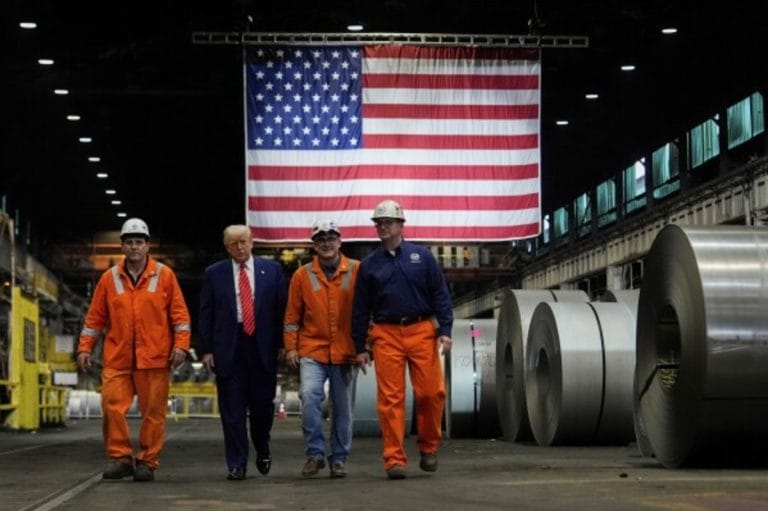🎧 Listen to This Article
President Donald Trump’s dramatic tariff hike on foreign steel and aluminum at 50% is poised to ripple far beyond factories and construction sites. Experts warn it could quietly squeeze consumers at the checkout line.
The metals impacted are essential to food packaging, from soup cans to soda, dog food, and tomato paste. Analysts and industry insiders say shoppers should brace for rising grocery prices, a sharp contrast to Trump’s repeated pledges to lower food costs.
“Rising grocery prices would be part of the ripple effects,” said Usha Haley, a trade expert at Wichita State University. “This may further strain U.S. relations with key allies and won’t revive American manufacturing meaningfully.”
What the Tariff Does
- Doubles tariffs on imported steel and aluminum to 50%
- Impacts a wide array of products far beyond traditional industrial use
- Takes effect Wednesday, June 5, 2025
Trump announced the hike at a rally outside Pittsburgh, flanked by cheering steelworkers. “This will even further secure the steel industry in the U.S.,” he claimed.
Unexpected Consequences
The biggest sticker shock may not come from cars or appliances but from cans of beans or tuna.
“Doubling the steel tariff will further increase the cost of canned goods,” said Robert Budway, president of the Can Manufacturers Institute. He warned that U.S. food manufacturers rely on imported tin mill steel as domestic production has plummeted.
If producers can’t find enough American-made materials, they must import at a much higher cost. And that cost? It lands squarely on American families.
Industry Voices Speak Out
- Campbell Soup Company: Already assessing the impact, may raise prices.
- ConAgra Brands (Reddi-Whip, Pam): “We can’t get all our materials from the US because there’s no supply,” said CFO David Marberger.
Meanwhile, broader inflationary effects are expected as businesses face higher costs to build stores, buy trucks, or operate machinery all requiring steel or aluminum.
The Trickle-Down Price Tag
Even items with no visible metal content may cost more. John Deere tractors, food transport trucks, and grocery store shelving all rely on materials that are now subject to new tariffs.
“If a John Deere tractor costs 25% more, consumers pay the price for that,” said Babak Hafezi, an international business expert at American University. “Prices will increase, and choices will decrease.”
Economic Trade-Off
While steelworkers cheer the move, economists say the benefit to the steel industry comes at a larger economic cost.
“You may get a few more steel jobs,” said Andreas Waldkirch, a trade economist at Colby College, “but the indirect costs could eliminate jobs elsewhere and create a large net economic loss.”
Even Walmart has hinted at price hikes in response to broader tariff trends. The result? What was meant to help American industry could end up hurting American wallets starting in aisle four.
For further details, clarification, contributions, or any concerns regarding this article, please get in touch with us at editorial@tax.news. We value your feedback and are committed to providing accurate and timely information. Please note that our privacy policy will handle all inquiries.



